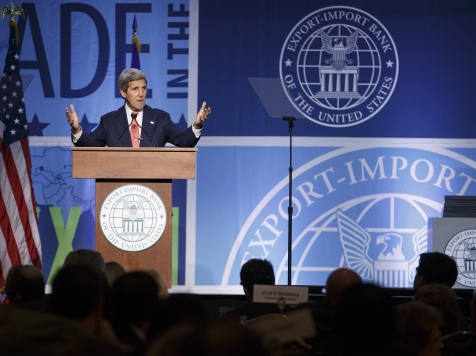Russia is trying to rebuild its former empire and it looks like it’s succeeding in Crimea and Ukraine. Meanwhile, economists point out that the Chinese economy is larger than that of the United States, and Beijing intends to expand its military power. Then there’s North Korea and Iran, both continuing to develop nuclear weapons and missile technology.
In the face of these growing risks, why is the United States unilaterally disarming?
In a theoretical world, a universal reduction in the number of nuclear weapons is a good thing. In the real world, only verifiable and enforceable international agreements to reduce nuclear weapons are worth considering. We are not safer — the world is not safer — if the U.S. disarms but no one else does.
The same can be said about international trade. There are calls to abolish the Ex-Im Bank – without international financing reform agreements – does nothing to promote free markets. It is essentially unilateral economic disarmament. This is why President Ronald Reagan supported the Ex-Im Bank and signed its re-authorization. Congress should follow Reagan’s lead.
The Ex-Im Bank, or Export-Import Bank, was created by Congress more than 75 years ago. It is periodically reauthorized — and is up for re-authorization this year. Historically, it has been a rather automatic, bipartisan matter. This time it is more contentious. Many nations subsidize their own industries. Many nations offer government provided, cut-rate financing to make the products of their own industries more appealing in the international marketplace. When this happens American firms not only have to compete with foreign companies but with their governments. China, Russia, France, and many European and South American nations not only subsidize state owned companies, but also offer aggressive, below market loans to induce foreign buyers to purchase their goods.
When American firms compete on quality and price, they win. American technology produces the best products on the planet. That is precisely why China, France, Brazil, Russia, and others, subsidize their major corporations and also intervene on behalf of their domestic manufacturers, offering cut rate financing so that they can undercut U.S. firms and win contracts.
Some of my fellow conservatives argue that the free market should decide which goods and services are bought and that government should not be involved. I agree. I only wish we could get China, Russia, Brazil, France and most of Europe and South America to agree as well. In too many places around the globe there is not a free market. The host governments have not only blurred the lines between government and the free market they have, in many cases, obliterated them.
In an ideal world, we’d have free trade agreements across the globe, and other nations would not use their industrial policy to tilt the playing field in their favor. Unfortunately that isn’t the real world today. If we unilaterally abolish the Ex-Im Bank without having verifiable and enforceable free trade agreements, we are effectively engaging in unilateral economic disarmament. Just as unilateral nuclear disarmament is naive and dangerous, unilateral economic disarmament will have real economic costs to America.
The Ex-Im Bank doesn’t cost taxpayers a dime — it is self-sustaining and returns money to the U.S. Treasury – more than one billion dollars in 2012 alone. Plus the Ex-Im Bank helps expand U.S. exports and supports about 205,000 U.S. high-paying manufacturing jobs. Since its inception, less than 2% of the Bank’s loans have ever defaulted, which is better than most private sector lenders. Because highly valued manufactured goods are part of the collateral for the loans, the risk is very low even in the event of a default.
The Ex-Im Bank does not provide direct aid or subsidies to U.S. firms. Instead, it assists U.S. manufacturers, large and small, to export their goods to foreign buyers. Some criticize the Ex-Im Bank claiming that large firms are the primary beneficiaries. However, this ignores the fact that these large American firms have thousands of smaller sub-contractors. Many of these are small, family owned businesses.
By law, the Ex-Im Bank does not compete with private sector lenders. It is a “lender of last resort” and simply provides economically sustainable loan guarantees where they are not otherwise available. Some nations have underdeveloped economies or banking systems. The Ex-Im Bank fills-in banking gaps so that U.S. goods can be exported to nations where commercial financing is insufficient or underdeveloped.
Government interference in the marketplace is too often counterproductive and costly. We need government to spend less, interfere less, and tax less. We must expand free trade, and reform the tax code and regulatory regime to ensure that America is competitive.
George Landrith is president of Frontiers of Freedom an educational institute whose mission is to promote the principles of individual freedom, peace through strength, limited government, free enterprise, free markets, and traditional American values as found in the Constitution and the Declaration of Independence.

COMMENTS
Please let us know if you're having issues with commenting.